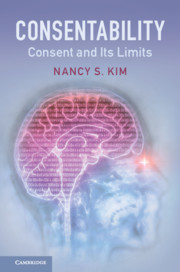Book contents
- Consentability
- Consentability
- Copyright page
- Dedication
- Contents
- Figures
- Acknowledgments
- Introduction
- Part I The Contours of Consent
- 1 What Does it Mean to Consent?
- 2 The Hard Cases
- Part II Consentability and Contractability
- Part III The Regret Principle and the Opportunism Corollary: Application
- Conclusion
- Cases
- Statutes
- Bibliography
- Index
1 - What Does it Mean to Consent?
from Part I - The Contours of Consent
Published online by Cambridge University Press: 08 February 2019
- Consentability
- Consentability
- Copyright page
- Dedication
- Contents
- Figures
- Acknowledgments
- Introduction
- Part I The Contours of Consent
- 1 What Does it Mean to Consent?
- 2 The Hard Cases
- Part II Consentability and Contractability
- Part III The Regret Principle and the Opportunism Corollary: Application
- Conclusion
- Cases
- Statutes
- Bibliography
- Index
Summary
Information
- Type
- Chapter
- Information
- ConsentabilityConsent and its Limits, pp. 7 - 17Publisher: Cambridge University PressPrint publication year: 2019
